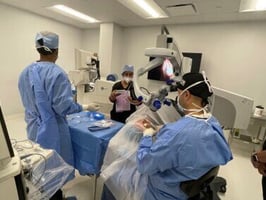Office-Based Surgery: An Industry Expert Reveals the Secrets to a Successful Practice (Podcast Episode Recap)
The following article is a recap of podcast episode 8 of Ophthalmology Business Academy, featuring Tony Burns, Principal Founder, Chief Strategy Officer of iOR Partners, and Naren Arulrajah, Founder of Ophthalmology Business Academy, Ophthalmology Marketing Consultant & CEO of Ekwa Marketing. Read more for secrets to a successful practice.
You can listen to the podcast interview in its entirety HERE.

Why is office-based surgery the future of ophthalmology?
(Time stamp: 00:02:55)
The transition to office-based surgery (OBS) is, for many surgeons, a natural progression.
In the late 1970’s, physicians saw great success when they first began conducting outpatient ophthalmic surgery, starting with the ability to discharge patients on the same day as their surgery. That led to the capability of outpatient surgery in a free-standing facility, utilizing an ambulatory service center.
That transition to ASCs was a huge step, and gave the physician greater control over how they could treat and manage their patients.
Office-based surgery is the next natural step forward in the industry. The technology, surgical techniques, and the way in which anesthesia is applied have taken the future of ophthalmology to the level that should be performed in the office.
Is office-based surgery less safe than surgery performed in a hospital?
(Time stamp: 0:04:16)
Office based surgery involves meticulous installation within the physician’s facility that meets the same standard of care required for ophthalmic surgery in an ASC.
In 2016, Kaiser Permanente published a study that profiled 21,501 cataract cases performed in an office based surgery setting. This was the largest US study investigating the safety and effectiveness of office-based cataract surgery performed in MPRs. According to the data, office-based efficacy outcomes were consistently excellent, with a safety profile on par with procedures performed in ASCs and HOPDs.
iOR Partners collects data on cases performed in iOR Surgical Suites as part of our accreditation program. Data from over 30,000 real-world cases performed in an office-based surgery facility match or beat safety outcomes in other outpatient settings.
In essence, physicians are simply transferring the site of service to the physician’s office, which in turn brings many measures of efficiency, comfort, and convenience to the patient’s treatment.
What are the characteristics of successful physicians?
(Time stamp: 00:10:49)
First and foremost is a physician’s connection with their patients.
Ophthalmology is one of the only specialties that allows physicians to upgrade their patient services. You can deliver an implant—an upgraded implant—and the patient can be charged for the additional cost. What you commonly see with practices that are successful both financially and relationally, is a relationship in which the patient has complete confidence in the physician.
When patients feel understood, they respond very well. After all, patients are coming to the physician viewing them as the expert, and they want to hear what the expert thinks.
A physician that can deliver their expertise in an effective manner—in a manner with compassion and integrity—are the ones that do well under any circumstance.
Lastly, physicians need to be flexible. As circumstances are always changing, physicians have to adapt and overcome, and move towards the newer modalities with an open mind.
What are some of the challenges faced by physicians in 2023?
(Time stamp: 00:12:27)
There’s a very large physician fee cut that has been slated; with that knowledge, diversification of revenue streams will gain importance to physicians.
Additionally, with the aging population, the volume of patients who need eye surgery is rapidly increasing. Rather than having difficulty finding patients, forecasts predict that physicians are going to have more patients than they know what to do with.
In order to manage the patient demand, physicians will have to figure out how to treat patients efficiently and efficiently. This includes being able to maximize their reimbursement per patient.
What is your advice for young and growing physicians?
(Time stamp: 00:14:53)
Quickly implement as much as you can in the diversification of your practice, and don’t limit yourself to one particular specialty.
If you’re going to be doing general ophthalmology, consider refractive surgery a part of that. Refractive cataract surgery is the name of the game.
Secondly, educate yourself in the ways of business. There are great programs out there that can educate physicians on the means and uses of economic resources that they need.
If you can’t pursue that means of education or have no interest in doing that, surround yourself with people who have that knowledge.
There’s still a tremendous amount of opportunity for any ophthalmologist who’s coming up, even in 2023. The patient volume that’s predicted to come is astronomical; the numbers out there are 200%, 300% of current volumes over the next decade.
With that kind of volume, that brings a huge amount of opportunity, and physicians need to be educated on how to maximize efficiency in their surgical practices.


